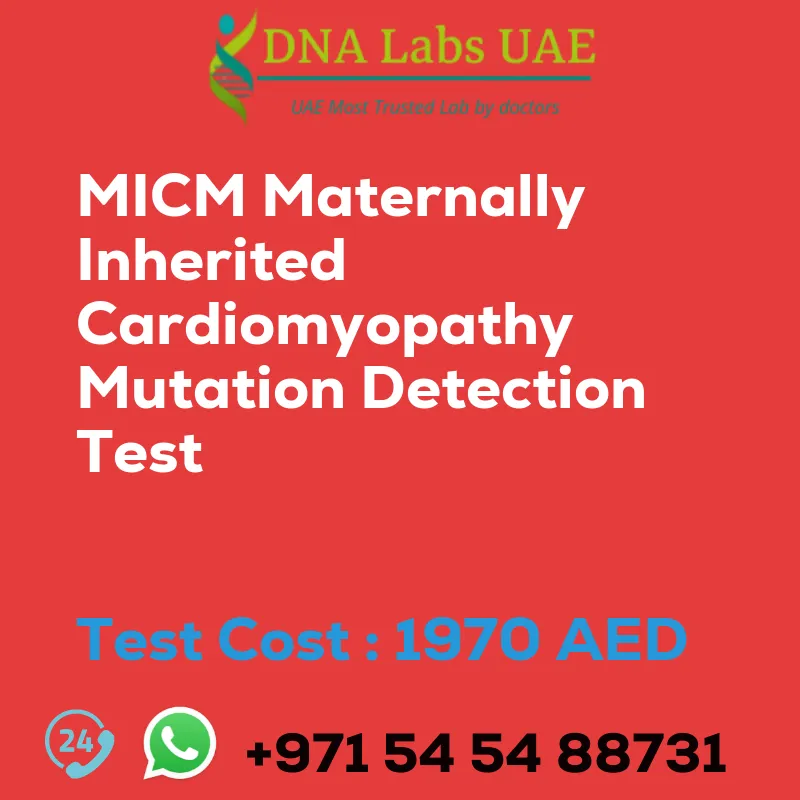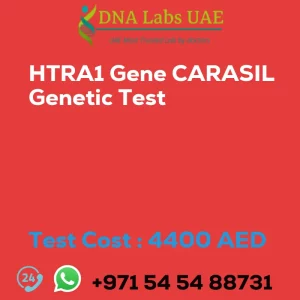MICM MATERNALLY INHERITED CARDIOMYOPATHY MUTATION DETECTION Test
Test Cost: AED 1970.0
Test Components:
- Price: AED 1970.0
Sample Condition:
- 4 mL (2 mL min.) whole blood in 1 Lavender top (EDTA) tube
- Ship refrigerated. DO NOT FREEZE.
- Duly filled Genomics Clinical Information Requisition Form (Form 20) is mandatory.
Report Delivery: Sample daily by 11 am; Report within 10 days
Method: PCR
Test Type: Heart Diseases
Doctor: Cardiologist
Test Department: Molecular Diagnostics
Pre Test Information: Duly filled Genomics Clinical Information Requisition Form (Form 20) is mandatory.
Test Details
The MICM (Maternally Inherited Cardiomyopathy) Mutation Detection Test is a genetic test used to detect mutations in genes that are associated with maternally inherited cardiomyopathy. Cardiomyopathy is a disease that affects the heart muscle and can lead to heart failure and other cardiovascular complications.
The test specifically looks for mutations in genes that are inherited from the mother, as certain forms of cardiomyopathy are known to be passed down through the maternal line. By identifying these mutations, healthcare providers can better understand the genetic basis of the disease and provide more targeted treatment and management options for affected individuals and their families.
The MICM Mutation Detection Test typically involves obtaining a blood or saliva sample from the individual undergoing testing. The sample is then sent to a laboratory where DNA sequencing techniques are used to analyze the genes of interest. The results of the test can help determine the presence or absence of specific mutations associated with maternally inherited cardiomyopathy.
It is important to note that this test is typically ordered by a healthcare provider who specializes in cardiovascular genetics or genetic counseling. They will assess the individual’s personal and family medical history to determine if the test is appropriate and provide counseling before and after the test to discuss the implications of the results.
The MICM Mutation Detection Test can provide valuable information for individuals and families affected by maternally inherited cardiomyopathy, helping to guide treatment decisions, inform family planning, and potentially identify other family members who may be at risk for the condition.
| Test Name | MICM MATERNALLY INHERITED CARDIOMYOPATHY MUTATION DETECTION Test |
|---|---|
| Components | |
| Price | 1970.0 AED |
| Sample Condition | 4 mL (2 mL min.) whole blood in 1 Lavender top (EDTA) tube. Ship refrigerated. DO NOT FREEZE. Duly filled Genomics Clinical Information Requisition Form (Form 20) is mandatory. |
| Report Delivery | Sample Daily by 11 am ; Report 10 days |
| Method | PCR |
| Test type | Heart Diseases |
| Doctor | Cardiologist |
| Test Department: | MOLECULAR DIAGNOSTICS |
| Pre Test Information | Duly filled Genomics Clinical Information Requisition Form (Form 20) is mandatory. |
| Test Details |
The MICM (Maternally Inherited Cardiomyopathy) Mutation Detection Test is a genetic test used to detect mutations in genes that are associated with maternally inherited cardiomyopathy. Cardiomyopathy is a disease that affects the heart muscle and can lead to heart failure and other cardiovascular complications. The test specifically looks for mutations in genes that are inherited from the mother, as certain forms of cardiomyopathy are known to be passed down through the maternal line. By identifying these mutations, healthcare providers can better understand the genetic basis of the disease and provide more targeted treatment and management options for affected individuals and their families. The MICM Mutation Detection Test typically involves obtaining a blood or saliva sample from the individual undergoing testing. The sample is then sent to a laboratory where DNA sequencing techniques are used to analyze the genes of interest. The results of the test can help determine the presence or absence of specific mutations associated with maternally inherited cardiomyopathy. It is important to note that this test is typically ordered by a healthcare provider who specializes in cardiovascular genetics or genetic counseling. They will assess the individual’s personal and family medical history to determine if the test is appropriate and provide counseling before and after the test to discuss the implications of the results. The MICM Mutation Detection Test can provide valuable information for individuals and families affected by maternally inherited cardiomyopathy, helping to guide treatment decisions, inform family planning, and potentially identify other family members who may be at risk for the condition. |








